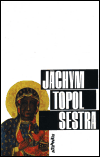In terms of the decade of the 1990s, Jáchym Topol is one of Czech literature's leading protagonists. Son of the playwright Josef Topol, grandson of the writer Karel Schulz and brother of (and lyricist for) Filip Topol, the much-loved frontman of the rock band Psí vojáci, Topol became engaged in the literary and political underground at an early age. In 1977, at age 15, he became the youngest signatory of the dissident intiative Charter 77. He associated with the leaders of the dissident intelligentsia, such as The Plastic People of the Universe manager Ivan Jirous, the poet Egon Bondy and the then playwright and political activist Václav Havel.
Topol began writing poetry at an early age, but far from devoting all his energy to his literary career, he also participated in the creation of samizdat publications. He contributed to the Revolver Revue and Respekt journals, both as journalist and editor. He left both publications not long after the Velvet Revolution.
Some of his early poems appeared in a samizdat collection entitled Miluju tě k zbláznění (I Love You Madly, 1988). However, as a published author, he is firmly rooted in the 1990s, since his first legitimate publication was the aforementioned collection put out by the Atlantis publishing house in 1990. Four years later, in 1994, Atlantis published his first novel, Sestra (City Sister Silver, Catbird, 2000).
A post-1989 novel
As one of the most powerful, and only, works of post-1989 writing to examine the conditions of the tumultuous transition period, the novel was a veritable blast onto the Czech literary scene. In its length and weighty content, Sestra tore away from the artistic pack and saw critics scrambling to make sense of it. Its reception was mostly favorable, but there were a few who had their reservations. Some of their issues included inscrutability of the plot, violence and darkness of the atmosphere and the frenzied word pacing.
Sestra seems to have confounded its admirers and critics alike, for the two sides appear to love or hate the novel for basically the same reasons. Its density and chaos have been taken by its sympathizers to reflect the social reality of the period immediately following the Velvet Revolution, with its fluctuations and free-market euphoria, ultimately leading to disillusionment and corruption. Sestra captures the irony, joy, confusion and gruesomeness inherent in the outlook of young Czechs during this period. Topol was one of the first of these young Czechs (he was in his very early thirties when he wrote Sestra) to address his generation's attitude toward the new times, and he was the only one to do so in such a creative and epic manner.
In March 2000, Catbird Press published Alex Zucker's English translation of Topol's novel Sestra. Meaning "sister" in Czech, the title was rendered in English as City Sister Silver, referring to the names of the novel's three parts. Catbird Press was founded in 1987 and specializes in American, British and European fiction with a particular emphasis on humorous writing. Though Catbird is a relatively small publishing enterprise, it is highly valued among those who are interested in Czech literature, for it is the only press with a series focused on Czech fiction in translation.
Catbird Press has produced undoubtedly the most comprehensive collection of Karel Čapek's works in English, comprising several volumes. But what makes its Czech literature publications so exceptional is the quest for fresh and innovative writing from the region. Far from focusing on classic, established Czech authors, Catbird Press has provided a medium for new artists through which to reach an English-speaking readership and has exposed Western audiences to the landscape of modern Czech writing. [See CER's review of another Catbird publication of contemporary Czech writing: Daniela Fischerová's Fingers Pointing Somewhere Else]
The explosion of time
Summarizing the plot of Sestra is a difficult task. The novel begins with the early stages of the Czechoslovak Revolution in 1989, as East German refugees are flooding the West German Embassy in Prague in hopes of gaining access to the West. And then time explodes. The explosion of time is Topol's oft-repeated metaphor for the Velvet Revolution and what it set in motion.
The main protagonist of Sestra, whose first-person narrative drives the plot forward—or, at times, backward—is Potok (meaning "stream" in Czech). Potok joins a semi-criminal entrepreneurial group that engages in the import/export business. The motley collection of personalities in Potok's group are referred to as being from the sewer, thus coating them with the veneer of mystery and vulgarity. They observe strict tribal codes of conduct and interrelation. The group gallivants about Prague and in one episode makes a trip to Auschwitz.
One facet of the group's behavior is its members' quasi-psychoanalytic dream analyses. During the course of Sestra, the dreams of most of the main characters are told. These dream sequences inform the text to such an extent that it is often not readily apparent where fantasy ends and reality begins.
But, the novel is first and foremost a love story, however atypical. Above the story of Potok and his clique lies the story of Potok's search for his "sister," or soul mate. Potok ultimately finds her in the character of Černá (meaning "black" in Czech) at the end of the book.
A rare language
The language of Sestra is its most interesting aspect, and it is here that the issue of translation comes to the fore. Anyone who has read Sestra in the original Czech will have an inkling as to the difficulty of such a task. The narrative not only blurs the line between the registers of speech but also introduces neologisms and entire sentences in other languages, such as Russian and German, which have a particular resonance to the Czech ear but can scarcely be understood by the English one.






